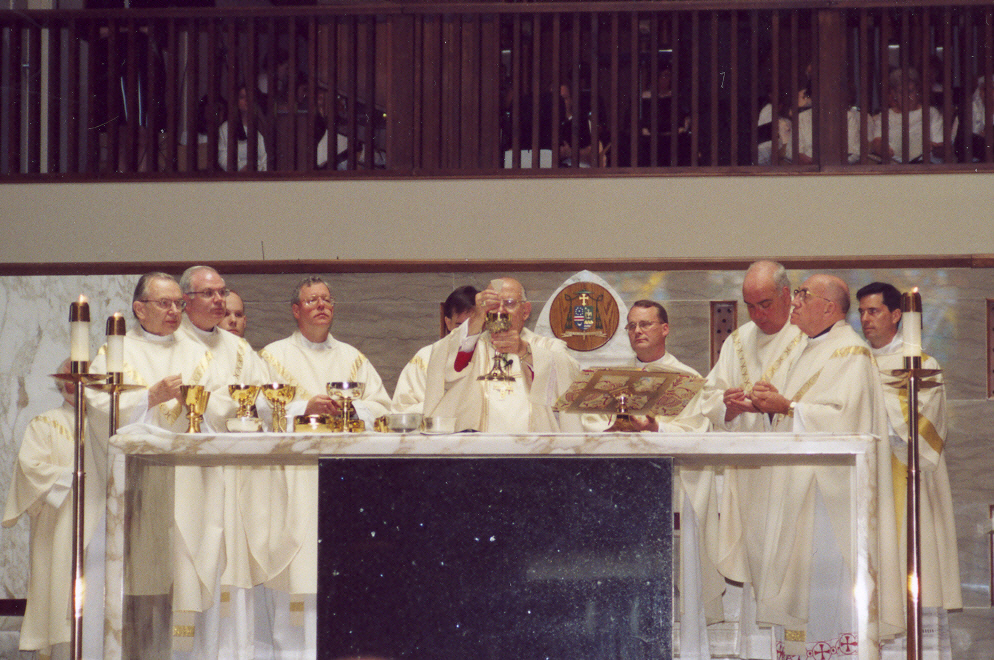
Preparation for Communion
by Rev. Albert F. Ernst, O.S.F.S.
"Behold the Lamb of God who takes away the sins
of the
world. Blessed are they who are called to His Supper."

Today is the first Sunday of Advent. Advent draws our attention to the first coming of our Lord down to this earth and His last coming at the end of the world. During Advent, Holy Mother Church is chiefly concerned with how well Her children are prepared to receive or to increase the divine life within them in their souls. The best sources of this divine life in us are the sacraments.
All the sacraments give us a share in God’s life. Some give it when we lack it entirely. Baptism gives it to us for the first time, and Penance restores it to us after it has been lost, or increases it if we are already in the state of grace when we go to Confession. The other five sacraments give an in increase of the divine life. They presuppose that we are already in the state of grace. All the sacraments, in addition to giving or increasing sanctifying grace give a special grace called sacramental grace, which strengthens us out the sacrament's particular purpose.
The sacramental grace of Baptism is a regenerative grace which helps us to live well the new supernatural life we have begun. Confirmation gives a strengthening grace which helps us profess our faith openly. Holy Eucharist confers a nourishing and unifying grace which helps us to be more closely united to God and to one another by supernatural charity. Penance strengthens us to detest sin, to satisfy for past sins committed and to avoid future sin. Anointing of the Sick is an alleviating grace which comforts us at particularly trying moments in life such as during serious physical or psychological situations. It is always recommended to comfort us and help to overcome final temptations in our last agony. The sacramental grace of Holy Orders is a consecrating grace which helps bishops and priests to discharge the duties of the sacred ministry faithfully. Matrimony bestows a special grace which helps the married couple live chastely and fulfill their duties to each other and to their children. Once we receive a sacrament we have a title or claim to the helps necessary for accomplishing the distinctive purpose of the sacrament.
The sacraments, always and infallibly, give grace if we receive them with the proper disposition. It is important to prepare well for the reception of the sacraments because ordinarily they confer grace in proportion to our dispositions.
Some of the sacraments imprint a character on the soul. This character is a spiritual mark, sometimes referred to as indelible, because it cannot be erased and lasts forever. It can be given only once. It is a mark of great distinction, making a person a child of God through Baptism, a soldier of Jesus Christ through Confession and another Christ through Holy Orders. This mark will be a mark of glory for those who are saved, a mark of shame for those who are lost.
All the sacraments impose an obligation, “To lay aside the works of darkness.” At Baptism – “Do you renounce Satan, and all his works and prompts?” It is, “To put on the armor of light.” Confirmation – To openly profess the faith. “To put on our Lord Jesus Christ.” Holy Orders – To become one with Christ, to act like our Lord did, to be prayerful, kind, forgiving, thoughtful and considerate of others.
With the sacraments in mind, may I suggest that during this four week period of preparation before Christmas, you receive the sacrament of Reconciliation, or Confession, several times, and Holy Communion during Mass perhaps even more than once a week. Then you will welcome him, who founded the sacraments with greater purity.